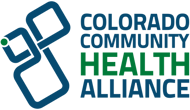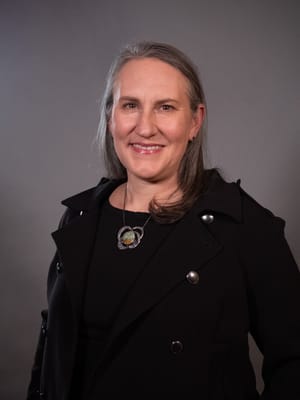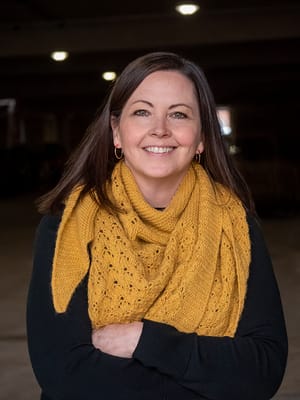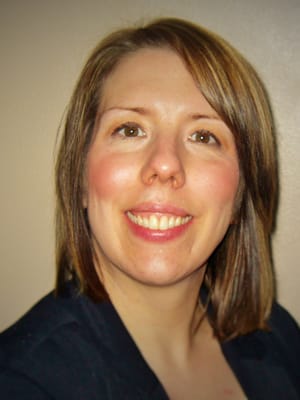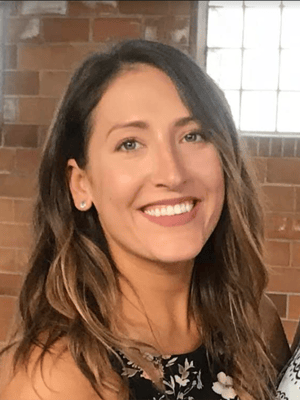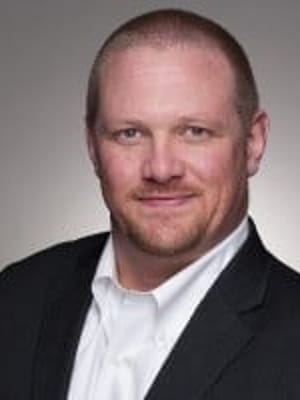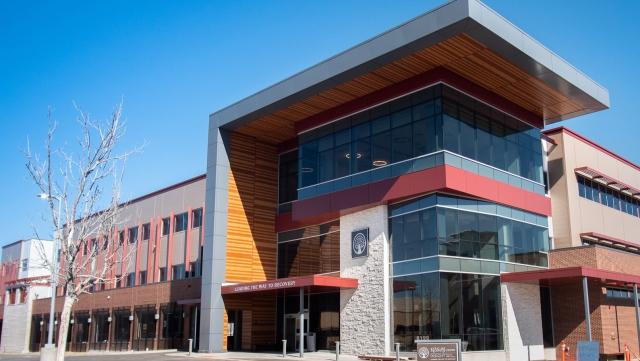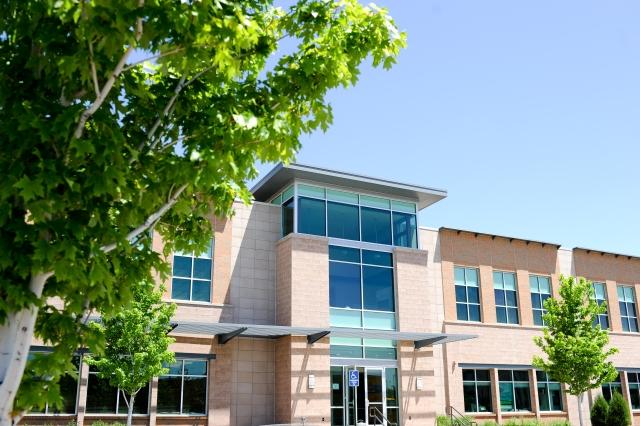Eating Recovery Center Denver - Spruce St
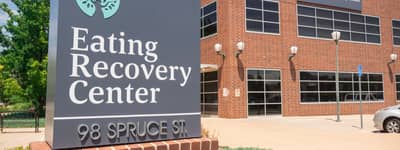
Location Details
Effective eating disorder treatment for kids and teens in Denver
Eating Recovery Center (ERC) Denver, located in the relaxed Lowry neighborhood east of Downtown Denver, provides care for children and adolescents with eating disorders.
At this location, ERC Denver-Pine, your loved one can benefit from the full continuum of eating disorder care:
- Partial hospitalization program (PHP)
- Residential
- Inpatient
ERC Denver spans multiple locations. Several ERC Denver locations, including this one, (Willow, Conifer and Pine) are situated within the Lowry clinical campus, near local shops and restaurants.
- Trusted by over 20,000 patients and their families
- 87% of former patients agreed that their experience at ERC was helpful
- 91% of parents of former patients would recommend ERC to others in need of services
- Specialized treatment designed by a team of experienced clinicians
Find Recovery with Evidence-Based Therapies

Benefit from state-of-the-art medical care for eating disorders
We are able to treat many medical complications onsite at ERC Denver-Pine or coordinate with local hospitals for emergencies.
- Primary care physicians onsite Monday through Friday
- 24/7 nursing and medical support offered in our inpatient and residential programs
- Supplemental tube feeding is available for patients in inpatient and residential care
We can also support co-occurring medical conditions like diabetes and co-occurring mental health concerns like anxiety, depression and obsessive-compulsive disorder (OCD).
Accredited by the Joint-Commission, the gold standard of healthcare, we provide the absolute best care for children and adolescents with complex medical and psychiatric disorders.
Start to heal the moment you feel heard
At ERC Denver-Pine, we invest in our patients and our families, focusing heavily on caregiver education, support and family therapy.
Caregivers learn how to interrupt the eating disorder with skills learned in family-based treatment and emotion-focused family therapy (EFFT).
Consistency among all of our locations includes:
- Accurate diagnosis and medication management
- Individualized treatment planning based on each patient’s unique history, personality, strengths and challenges
- A foundation of compassionate care that includes individual, group and family therapy
- Up to three hours per day, Monday through Friday, devoted to working with our educational specialists on academics
“Eating disorders can have a devastating impact on families. In recovery, a child’s family is their greatest resource. I have a passion for helping caregivers navigate the challenges of caring for a child with mental illness. I enjoy helping children, adolescents and their families move towards freedom.”
Who We Treat
-

Children & Adolescents
We can help guide you and your child on a path to long-lasting change and healing.
-

Adults
We provide eating disorder treatment and mood and anxiety disorder treatment for all genders ages 18 and older.
Struggling with an eating disorder?
One conversation can make all the difference. Connect with us today.
Conditions We Treat
-

Eating Disorders
An eating disorder is a treatable mental illness that includes a number of different symptoms, including extreme emotions, attitudes, and behaviors surrounding weight and food issues.
-

Anorexia
Anorexia nervosa is characterized by an obsessive fear of weight gain and a refusal to maintain a healthy body weight.
-

Atypical Anorexia
You can’t tell if someone has an eating disorder just by looking at them. See how atypical anorexia affects people in a variety of body shapes and sizes.
-

ARFID
ARFID is a lesser known eating disorder that frequently begins as early as infancy or childhood, but adults can also suffer.
-

Binge Eating Disorder
Binge eating disorder is characterized by frequent overeating – at least once a week for three months – combined with a lack of control, intense feelings of distress and several other characteristic behaviors.
-

Bulimia
Bulimia is characterized by patterns of bingeing and purging.
-

Compulsive Overeating
Compulsive overeating can involve binge eating and weight gain, but it can also involve other behaviors.
-

Diabulimia
The term diabulimia is used to describe the diagnosis of an eating disorder in an individual with type 1 diabetes. These patients intentionally misuse insulin for weight control.
-

OSFED
Some eating disorders do not meet all of the diagnostic criteria for specific diagnoses like anorexia nervosa and bulimia nervosa.
-

Orthorexia
Some people go to extremes to “eat clean” at all times. This may lead to a disordered eating pattern known as orthorexia.
Struggling with an eating disorder?
One conversation can make all the difference. Connect with us today.
Levels of Care Offered
-

Inpatient
Our Inpatient programming is designed to support adults, children and adolescents of all genders who are acutely ill and are experiencing medical and mood instability as a result of their eating disorder.
-

Residential
Within ERC Pathlight's step-down model of care, the Residential eating disorder treatment program as well as the Residential mood & anxiety treatment program offer medically stable patients a highly-structured and supportive 24-hour treatment environment.
-

Partial Hospitalization
Our Partial Hospitalization Program (PHP) offers some of the same intensity and structure of Residential mood, anxiety, and eating disorder treatment while providing additional opportunities to practice recovery outside of the controlled eating disorder treatment environment during evenings at home or in peer-supported apartment communities.
-

On-Site Intensive Outpatient Treatment
Our Intensive Outpatient program is a flexible mood, anxiety, and eating disorder treatment program that allows patients to work, go to school, or care for children during the day and sleep at home at night.
-

Virtual Intensive Outpatient - Eating Recovery At Home
ERC is removing the barriers that can keep patients with anorexia, bulimia, and other eating disorders from receiving treatment. Through telebehavioral health programming, Eating Recovery At Home (our virtual Intensive Outpatient Program) offers the same proven care as our in-person treatment centers.
Struggling with an eating disorder?
One conversation can make all the difference. Connect with us today.
Eating disorder continuum of care
Inpatient eating disorder treatment
In our inpatient program, patients work with the same team members, in the same building, throughout all levels of care. Family involvement is critical to recovery, starting from day one. As we care for your loved one, we will teach you how to be the bridge to recovery for your loved one until they are ready to manage recovery themselves.
Residential eating disorder treatment
Explore new approaches to healing in residential care. As young patients become more stable, outings become more frequent, and therapy deepens. Care includes:
- Individual, group and family therapy
- Nutritional counseling and education
- Art therapy
- Yoga
7-day PHP
Research shows that 5-day (weekday-only) PHP participation may lead to increased eating disorder behaviors over the weekend. Since eating disorders don’t take the weekend off, we don’t either. Young patients in ERC's PHP benefit most from care 7 days a week. We provide programming 7 days a week to give your loved one the best chance of recovery.
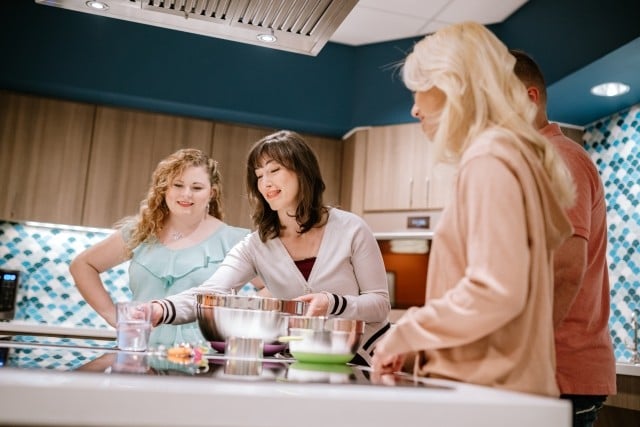
Nutritional Counseling & Education
In eating disorder treatment, your loved one’s primary medicine is proper nutrition. Our goal is to help all of our patients develop a healthy relationship with food.
Daily meals and snacks provide opportunities for nourishment and social connection. Our proprietary food service model provides fresh, attractive and tasty meals, prepared daily in our state-of-the-art kitchen.
In treatment, caregivers are provided daily support and education around:
- Meal planning
- Food preparation
- Food portioning, and more
We are able to accommodate vegetarian, gluten-free, kosher and halal diets, as well as food allergies.
Questions about travel?
If you are traveling for care, you are far from alone. Most patients seeking care at ERC Denver come to us from out of state. That's why we prioritize travel and family support services-to eliminate unnecessary stress for you and your family.
To help make the eating disorder admissions process as smooth as possible, let us know if you have questions related to:
- Transportation
- Accommodations, hotels and lodging options
- Local resources
Travel concerns shouldn't get in the way of your loved one receiving the quality treatment they need and deserve. If you need help finding short-term housing nearby, we can help.
Family-based treatment that works
Support for Families
Overwhelmed? We can help you find the support you need, offering you a caregiver toolbox filled with eating disorder recovery skills.
Find support and community by taking part in our:
We also offer a Denver-based support group just for caregivers whose loved ones are in treatment at ERC Denver.
Support for LGBTQIA+ Individuals
Recover with pride and love all of who you are. Our team is deeply committed to creating a safe, supportive and affirming environment for each one of our LGBTQIA+ patients.
We ensure that all of our clinicians and staff are both compassionately and professionally trained to honor and support our patients wherever they are on their journey with physical and emotional attraction, gender identity, gender expression, and mental health recovery.
Support for Students
Eating disorders can disrupt a young person’s education. To support our young patients and their developing minds, we offer devoted time to academic work on weekdays.
Our compassionate education specialists provide an extra dose of warmth as they coordinate with parents, teachers and guidance counselors. Our goal is to make sure each student stays updated with their education as long it fits into their recovery journey.
If your child needs individual education support, please let us know and we will work to make that happen.
Testimonials
Just one phone call to get started
Eating disorders are serious mental health conditions that can take over your loved one’s life. Reaching out for help is an important and brave first step. Give us a call and our compassionate admissions team will walk you through the entire process with care and support.
No referral is ever needed for you to access the treatment you need and deserve.
Let us help you with insurance
The insurance process can be complicated, so we do everything we can to make it easy on you. Since your top priority is finding the best care possible for your loved one, we can contact your insurance company for you and communicate back to you exactly what your coverage includes, in easy-to-understand terms.
Get matched with the exact support you need.
With one conversation, our mental health professionals will help you better understand what you’re going through and what you need.
We will meet you where you are, listen to your story in a therapeutic setting, and match you with the level of support that meets your struggle.
Covered by Most Commercial Insurance Plans
Our patient access team is here to advocate for you. We can help you address financial challenges and work with you to get you the maximum coverage offered by your plan.
Frequently Asked Questions
-
How does ERC Denver create eating disorder treatment plans?
Since families and caregivers are critical to the recovery process, we incorporate families and caregivers in every step of the treatment plan. Any changes to treatment or strategies for care are only made in collaboration with caregivers. We do not make changes to the treatment plan without talking to family members first. Treatment planning is done in a collaborative model among all members of the treatment team, including:
- Psychiatrist
- Primary therapist
- Family therapist
- Registered dietitian
- Social workers, and others
-
Where is ERC Denver-Pine located?
ERC Denver-Pine, at 98 Spruce Street, is conveniently located in the Lowry neighborhood of Denver, the capital of Colorado, in a vibrant community that supports eating disorder recovery. We are 12 miles east of the foothills of the beautiful Rocky Mountains. If you are traveling for care, take advantage of nearby shops and restaurants in the Lowry community. Denver is also home to 3 major sports stadiums, multiple art and history museums, white water rafting, hiking and more.
-
What support do you offer once eating disorder treatment ends?
We have an entire team devoted to supporting each of our patients after they discharge from care. Before your loved one leaves treatment, we can help them get set up with an intensive outpatient program like Eating Recovery At Home. We can also help them get set up with an outpatient treatment team, including a registered dietitian, psychiatrist and therapist. Regular phone calls and check-ins from our Community Outreach Liaisons ensure you have a plan of action to maintain recovery.

Find Virtual Eating Disorder Treatment in Colorado
We also offer virtual eating disorder treatment for individuals in Colorado through our Eating Recovery At Home program. Individuals in all cities and towns across Colorado, including the cities listed below, are eligible to participate in Eating Recovery At Home, our virtual intensive outpatient program.
- Denver
- Colorado Springs
- Aurora
- Fort Collins
- Lakewood
- Thornton
- Arvada
- Westminster
- Pueblo
- Breckenridge
- Grand Junction
- Boulder
- Highlands Ranch
- Longmont
- Castle Rock
- Glenwood Springs
- Aspen
- Vail
Hide Last Child Layout Div
#who-we-treat, #conditions, #levels-of-care javascript
Show Who We Treat, Conditions, Levels of Care









